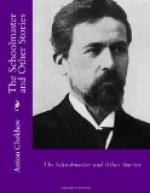A silence followed; the director walked up and down, still thinking, and Vremensky, overwhelmed by his trouble, sat on the edge of his chair, and he, too, thought. All at once the director began beaming, and even snapped his fingers.
“I wonder I did not think of it before!” he began rapidly. “Listen, this is what I can offer you. Next week our secretary at the Home is retiring. If you like, you can have his place! There you are!”
Vremensky, not expecting such good fortune, beamed too.
“That’s capital,” said the director. “Write the application to-day.”
Dismissing Vremensky, Fyodor Petrovitch felt relieved and even gratified: the bent figure of the hissing schoolmaster was no longer confronting him, and it was agreeable to recognize that in offering a vacant post to Vremensky he had acted fairly and conscientiously, like a good-hearted and thoroughly decent person. But this agreeable state of mind did not last long. When he went home and sat down to dinner his wife, Nastasya Ivanovna, said suddenly:
“Oh yes, I was almost forgetting! Nina Sergeyevna came to see me yesterday and begged for your interest on behalf of a young man. I am told there is a vacancy in our Home. . . .”
“Yes, but the post has already been promised to someone else,” said the director, and he frowned. “And you know my rule: I never give posts through patronage.”
“I know, but for Nina Sergeyevna, I imagine, you might make an exception. She loves us as though we were relations, and we have never done anything for her. And don’t think of refusing, Fedya! You will wound both her and me with your whims.”
“Who is it that she is recommending?”
“Polzuhin!”
“What Polzuhin? Is it that fellow who played Tchatsky at the party on New Year’s Day? Is it that gentleman? Not on any account!”
The director left off eating.
“Not on any account!” he repeated. “Heaven preserve us!”
“But why not?”
“Understand, my dear, that if a young man does not set to work directly, but through women, he must be good for nothing! Why doesn’t he come to me himself?”
After dinner the director lay on the sofa in his study and began reading the letters and newspapers he had received.
“Dear Fyodor Petrovitch,” wrote the wife of the Mayor of the town. “You once said that I knew the human heart and understood people. Now you have an opportunity of verifying this in practice. K. N. Polzuhin, whom I know to be an excellent young man, will call upon you in a day or two to ask you for the post of secretary at our Home. He is a very nice youth. If you take an interest in him you will be convinced of it.” And so on.
“On no account!” was the director’s comment. “Heaven preserve me!”
After that, not a day passed without the director’s receiving letters recommending Polzuhin. One fine morning Polzuhin himself, a stout young man with a close-shaven face like a jockey’s, in a new black suit, made his appearance. . . .




